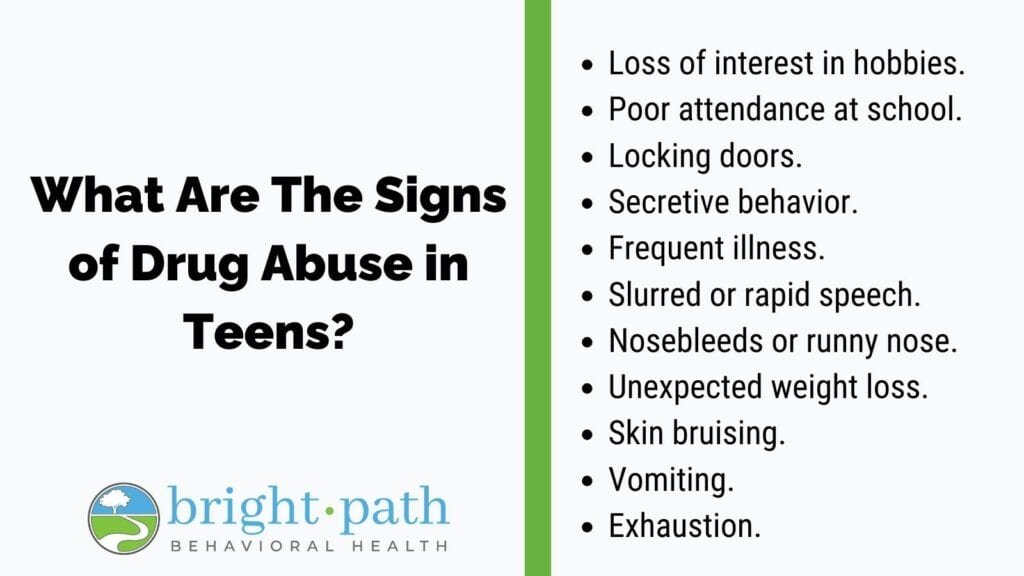Teen drug use in the United States has become a major social issue in recent years. According to data published by the National Center for Drug Abuse Statistics, 2.08 million or 8.33% of 12- to 17-year-olds nationwide have reported using drugs in the last month. Substance use among eighth-graders has skyrocketed by 61% from 2016 to 2020. Moreover, by the twelfth grade, 62% of teenagers had abused alcohol.
Signs of drug abuse in teens can include observable shifts in mood, altered behavior, and changes in appearance may indicate potential substance misuse. Parents should maintain open communication with their teens, addressing concerns rather than dismissing warning signs as typical adolescent behavior.
The effects of drug abuse on teens extend beyond behavioral changes to encompass severe consequences on physical health, mental well-being, and social aspects. Substance abuse during adolescence can have a long-term impact on neurological and mental health. It can affect memory, learning abilities, and psychomotor skills, and increase the risk of accidents, unsafe practices, social isolation, and academic struggles.
Preventing drug abuse in teens requires a multi-faceted approach. Families play a crucial role in preventing and addressing teen drug abuse effectively. This includes fostering open discussions about substance use, setting clear boundaries, and providing a strong support system. Seeking medical help, including consultation with primary care providers or addiction specialists, is vital when signs of drug use are identified. Inpatient or outpatient drug rehabilitation, along with detoxification when necessary, ensures a holistic approach to address both substance use and co-occurring mental health issues in adolescents. Early intervention and a supportive environment are key elements in preventing and addressing drug abuse in teens effectively.
What is Drug Abuse In Teens?
Drug abuse in teens refers to the habitual and excessive use of substances, including illegal drugs or the misuse of prescription medications, leading to negative physical, psychological, or social consequences. In the context of teenagers, drug abuse often involves experimentation with substances, risking addiction, impaired academic or social functioning, and potential long-term health issues. Identifying signs of drug abuse in teens is crucial for early intervention and support.
What Are Common Drugs That Teens Abuse?
Alcohol and tobacco are the two most frequently abused substances by teenagers, according to the National Institute on Drug Abuse. Marijuana is also commonly abused by teens. The drugs that are most commonly used after these top three differ based on age group.
Substances such as household cleaners or glues are more likely to be abused by younger adolescents. Synthetic marijuana, commonly known as K2 or Spice, is reported to be used more by older adolescents. Prescription medications, including opioids (Vicodin) and stimulants (Adderall), are commonly abused by older teens.

What Are The Signs of Drug Abuse in Teens?
Signs of drug abuse in teenagers can manifest as changes in mood, alterations in personality, behavioral cues, shifts in hygiene or appearance, and physical health indications. As a parent, it is crucial to not dismiss these warning signs as typical teenage behavior but instead recognize them as potential red flags. Maintaining open and honest communication with your teenager is essential to address these issues.
Behavioral Signs of Drug Abuse in Teens
Behaviors that may signal drug abuse among teenagers include:
- Altered relationships with friends and family.
- Loss of interest in hobbies.
- Poor attendance at work or school.
- Locking doors.
- Secretive behavior.
- Periods of high energy followed by extended periods of sleep.
Parents should prioritize open communication with their teens and seek professional guidance if needed.
Physical Signs of Drug Abuse in Teens
During the screening for drug abuse, it is important to monitor various physical indicators. These may include:
- Frequent illness.
- Slurred or rapid speech.
- Nosebleeds or a runny nose.
- Unexpected weight loss.
- Skin bruising.
- Vomiting.
- Exhaustion.
What Are The Effects of Drug Abuse in Teens?
Youth substance abuse can have a range of negative impacts on different aspects of an adolescent’s life. According to research, these effects can be complex, affecting their academic performance, physical health, mental well-being, relationships with family and peers, and even leading to broader social and economic consequences. Below, you will find a detailed analysis of the effects of drug use on the body and its consequences.
Academic Effects of Drug Abuse In Teens
- Declining grades, increased absenteeism, and a higher likelihood of dropping out are associated with adolescent substance abuse.
- Low commitment to education and higher truancy rates.
- Cognitive and behavioral problems resulting from substance use may hinder academic performance.
Physical Effects of Drug Abuse On Teenagers
- Injuries from accidents, physical disabilities, and diseases are health-related consequences of teenage substance abuse.
- Substance-abusing youth face an elevated risk of death through suicide, homicide, accidents, and illnesses.
- Emergency department episodes related to drug use among youth have shown an alarming increase.
Effects of Drugs on The Developing Brain
Teen substance abuse can lead to neurological development issues and severe mental health problems. Such mental health problems may include depression, developmental delays, anxiety, personality disorders, and suicidal ideation. Scientific studies have revealed that marijuana use can negatively affect a teen’s short-term memory, learning abilities, and psychomotor skills.
Mental Health Effects
- Mental health issues such as depression, developmental lags, apathy, and withdrawal are frequently associated with substance abuse in adolescents.
- Substance-abusing youth are at a higher risk for various mental health problems, including suicidal thoughts and attempts.
- Marijuana use, prevalent among youth, has been shown to interfere with memory, learning, and psychomotor skills.
Effects of Drug Abuse on Relationships With Peers
- Substance-abusing youth often face alienation and stigmatization from their peers.
- Engagement in alcohol and drug use may lead to disengagement from school and community activities.
Effects of Drug Abuse on Relationships With Families
- Family crises and dysfunction can result from the abuse of alcohol and other drugs by youth.
- Siblings and parents are profoundly affected, both emotionally and financially, by alcohol- and drug-involved youth.
Social and Economic Consequences
- High social and economic costs resulting from alcohol- and drug-related crime victims, increased burdens on supporting youth unable to become self-sufficient, and greater demands for medical and treatment services.
Delinquency
- Substance abuse is strongly correlated with delinquent behavior, leading to arrest, adjudication, and intervention by the juvenile justice system.
- Possession and use of alcohol and drugs are illegal for all youth, contributing to involvement with negative peer groups and increasing the burden on criminal justice resources.
The impact of drug use is not limited to individual health but it also affects academic performance, mental health, and family relationships, and contributes to broader societal issues. To tackle substance abuse in adolescents, it is important to implement comprehensive strategies that take into account the far-reaching consequences of drug use on multiple levels.
Preventing Drug Abuse In Teens
The use of alcohol or non-prescription drugs can transform the teenage brain, increasing the risk of addiction and severe consequences. Effective prevention strategies are crucial in safeguarding adolescents from these challenges.
1. Establish a Strong Support System
Encourage family support to fortify teens against peer pressure. Open discussions within families, coupled with the setting of clear boundaries regarding drug use and alcohol consumption, foster a resilient support structure.
2. Seek Timely Professional Guidance
If you suspect that a teenager may be using drugs, it is important to take quick action. You can seek guidance from the teen’s primary care provider, a school social worker, or a reputable drug rehabilitation facility to get expert advice. It’s important to understand that addiction can progress rapidly, so timely intervention is crucial.
What Are The Causes of Drug Abuse in Teens?
As outlined by the National Institute on Drug Abuse, adolescents may engage in drug and alcohol experimentation for the following primary reasons:
- To assimilate and gain social acceptance, influenced by peer pressure.
- To experience pleasure by activating brain pleasure pathways.
- To alleviate stress, address mental health concerns, or cope with physical pain.
- To enhance performance in academics or athletics.
- To engage in thrill-seeking and explore new experiences.
Can Depression Be A Cause of Teen Drug Abuse?
MDD, or Major Depressive Disorder, is a prevalent diagnosis that affects young people and teenagers. The relationship between drug abuse and depression in adolescents can create a dangerous cycle that has serious consequences for their academic performance, social interactions, and future prospects. Substance use among teenagers is often accompanied by mental health conditions such as mood disorders, anxiety, behavioral disorders, and learning disabilities.
It is highly recommended that adolescents seeking treatment for substance abuse are provided with a thorough evaluation of their behavioral health, including their mental well-being. Studies have proven that in order for treatment to be successful, both substance abuse and mental health issues should be addressed simultaneously.
Is Accessibility One Of The Causes of Drug Abuse in Teens?
Their surroundings can greatly influence the likelihood of a teenager developing a drug abuse problem. If drugs and alcohol are readily available to them, their risk of addiction increases significantly. To combat the issue of teen drug abuse, it is crucial to educate both parents and teenagers about the dangers of drug and alcohol abuse. Proper communication between parents and teens, as well as the implementation of safe medication storage and disposal practices, can be instrumental in saving young lives.
Can Prescription Drugs Cause Teenage Drug Abuse?
Research has indicated that 25% of adolescents think that using prescription drugs is a secure method to enhance their studying abilities. Additionally, 33% of parents believe that ADHD medication can boost their offspring’s academic performance, irrespective of whether their child has been diagnosed with ADHD or not. It is never advisable for teenagers to consume medication without a prescription.
Comprehensive Behavioral Health Treatment
At Bright Path, we extend our commitment beyond traditional treatment methods to offer innovative programs, such as the Adolescent Wellness After-School Extended Path Program, designed to provide dedicated support, growth opportunities, and a sense of community for adolescents seeking mental health enrichment. Additionally, our Educational Bridge emphasizes the vital link between teen mental health and academic success, recognizing the interconnected nature of these aspects in teenagers’ lives.
For those in need of more intensive support, our Outpatient Programs and Partial Hospitalization Program offer flexible and effective solutions, allowing teens to receive intensive mental health treatment while maintaining the comfort of their own homes.
We believe in involving families in the healing process, offering virtual parent groups and Family Involvement Programs to support parents in understanding and navigating their teen’s mental health journey. Bright Path is not just a treatment center; it is a beacon of hope, guiding teens and their families toward comprehensive well-being.

Share This Post




